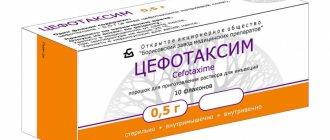Pharmacological properties of the drug Ginipral
Selective beta2-adrenomimetic, reduces the tone and contractile activity of the myometrium. Reduces the frequency and intensity of uterine contractions, suppresses spontaneous and oxytocin-induced labor contractions. During childbirth, it normalizes excessively strong or irregular contractions. Under the influence of the drug, premature contractions stop in most cases, which makes it possible to prolong pregnancy until the normal term of birth. Due to its beta2 selectivity, the drug has a slight effect on the cardiac activity and blood flow of the pregnant woman and the fetus.
Pharmacodynamics and pharmacokinetics
Hexoprenaline is a selective beta-2-sympathomimetic, consisting of two catecholamine groups. The active substance has the ability to block specific receptors of the uterus and relax its muscles. The frequency and intensity of contractions is significantly reduced. The medicine blocks labor contractions (spontaneous or caused by the hormone oxytocin ).
During childbirth, Ginipral can normalize the strength and regularity of uterine contractions and suppress premature contractions. The medicine, for those who took it during pregnancy, allowed them to carry the fetus to normal term. The drug has the ability to slightly influence the cardiovascular system of a pregnant woman and fetus.
Immediately after intravenous administration of the drug, contractions begin to be suppressed, and the effect of the drug continues for about 20 minutes.
After entering the body, the active substance undergoes methylation using catecholamine-o-methyltransferase . It is noteworthy that the catecholamine groups must undergo the methylation , otherwise hexoprenaline will become biologically inactive. Therefore, the product affects the body for quite a long time.
In the first 4 hours after taking the drug, about 80% of the active components of the drug are excreted in the urine. A small amount of the drug is excreted in the bile as metabolites .
Indications for use of the drug Ginipral
Acute tocolysis: rapid suppression of labor contractions in cases of acute intrauterine asphyxia (fetal distress); before manual rotation of the fetus from a transverse position; with prolapse of the umbilical cord; complicated labor; relaxation of the uterus before caesarean section. Massive tocolysis: inhibition of premature contractions in the presence of a smoothed cervix and/or dilatation of the uterine pharynx. Long-term tocolysis: danger of premature birth (uterine contractions without shortening and dilation of the cervix); relaxation of the uterus before, during and after cerclage application. Bronchial asthma (treatment and prevention), broncho-obstructive syndrome, bronchospastic reactions of various origins.
Use of the drug Ginipral
For IV injections or infusions. The contents of the ampoule must be administered intravenously slowly (over 5-10 minutes) using automatically dosing infusion pumps or using conventional infusion systems - after diluting with isotonic sodium chloride solution to 10 ml. Dosage:
- Acute tocolysis. 10 mcg (1 ampoule of 2 ml). In the future, if necessary, treatment can be continued with infusions (see instructions for use of GINIPRAL (25 mcg concentrate for preparation of infusion solution).
- Massive tocolysis. At the beginning, treatment begins with the administration of 10 mcg (1 ampoule of 2 ml), followed by infusion of GINIPRAL at a rate of 0.3 mcg/min. As an alternative treatment, it is possible to use only GINIPRAL infusion at a rate of 0.3 mcg/min, without prior bolus administration of the drug.
- Long-term tocolysis. Long-term drip infusion of 0.075 mcg/min (see instructions for use of GINIPRAL 25 mcg concentrate for the preparation of infusion solution). If contractions do not resume within 48 hours, treatment can be continued with GINIPRAL 0.5 mg tablets (see appropriate instructions for use).
The indicated dosage can only be used as a guide; during tocolysis it must be adjusted individually. During the use of GINIPRAL, the mother's pulse and blood pressure, as well as the fetal heartbeat, should be monitored. It is recommended to record an ECG before and during treatment. Patients with hypersensitivity to sympathomimetics should use GINIPRAL in small doses prescribed individually, under constant medical supervision. If there is a significant increase in the mother's heart rate (more than 130 beats/min) and/or a significant decrease in blood pressure, the dose should be reduced; If there are complaints of difficulty breathing, pain in the heart, or if signs of heart failure appear, the use of GINIPRAL should be stopped immediately. Pregnant women with diabetes should monitor carbohydrate metabolism, because the use of GINIPRAL, especially in the initial stage of treatment, may cause an increase in blood sugar levels. If childbirth occurs immediately after a course of treatment with GINIPRAL, it is necessary to take into account the possibility of hypoglycemia and acidosis in newborns due to transplacental penetration of acidic metabolic products (lactic and ketonic acids). In some cases, the simultaneous use of corticosteroids during GINIPRAL infusions may cause pulmonary edema. Therefore, during infusion therapy, constant careful clinical monitoring of patients is necessary. This is especially important during combined treatment with corticosteroids in patients with concomitant diseases that contribute to fluid retention (kidney disease). The risk of possible development of pulmonary edema requires limiting the volume of infusion as much as possible, as well as using dilution solutions that do not contain electrolytes. You should limit your salt intake from food. Before starting tocolytic therapy, it is necessary to take potassium supplements, because with hypokalemia, the effect of sympathomimetics on the myocardium is enhanced. The simultaneous use of certain narcotic drugs (halothane) and sympathomimetics can lead to cardiac arrhythmias. Taking GINIPRAL must be stopped before using halothane for anesthesia. With prolonged tocolytic therapy, it is necessary to ensure that there is no placental abruption. Clinical symptoms of premature placental abruption can be smoothed out with tocolytic therapy. When the membranes rupture and when the cervix is dilated by more than 2-3 cm, the effectiveness of tocolytic therapy is low. During tocolytic treatment with beta-agonists, the symptoms of concomitant dystrophic myotonia may intensify. In such cases, the use of diphenylhydantoin (phenytoin) drugs is recommended. armacodynamic and pharmacokinetic: Non-selective beta blockers weaken the effect of GINIPRAL or neutralize it. Methylxanthines, e.g. theophylline, enhance the effect of GINIPRAL. The intensity of glycogen accumulation in the liver caused by the use of glucocorticoids is reduced by the action of GINIPRAL. GINIPRAL weakens the insulin effect of antidiabetic drugs. The simultaneous use of GINIPRAL with other sympathomimetics (drugs for normalizing blood circulation, anti-asthmatic drugs) should be avoided, because this may cause increased effects on cardiac function and symptoms of overdose. GINIPRAL is not recommended for use together with ergot alkaloids, as well as with preparations containing calcium and vitamin D, dihydrotachysterol or mineralocorticoids. Compatibility. Sulfite is a highly active component, so you should refrain from mixing GINIPRAL with solutions other than isotonic sodium chloride solution and 5% glucose solution.
Ginipral, 5 pcs., 2 ml, 10 mcg/2 ml, solution for intravenous administration
During the use of Ginipral®, you should monitor the mother's pulse and blood pressure, as well as the fetal heartbeat.
It is recommended to record an ECG before and during treatment.
Patients with hypersensitivity to sympathomimetics should use Ginipral® in small doses prescribed individually, under constant medical supervision.
If there is a significant increase in maternal heart rate (more than 130 beats/min) and/or a marked decrease in blood pressure, the dose should be reduced; if there are complaints of difficulty breathing, pain in the heart and if signs of heart failure appear, the use of Ginipral® should be stopped immediately.
Pregnant women with diabetes should monitor carbohydrate metabolism, because the use of Ginipral® (especially in the initial stage of treatment) may cause an increase in blood sugar levels. If childbirth occurs immediately after a course of treatment with the drug, it is necessary to take into account the possibility of hypoglycemia and acidosis in newborns due to transplacental penetration of acidic metabolic products (lactic and ketonic acids).
In some cases, simultaneous use of GCS during Ginipral® infusion may cause pulmonary edema. Therefore, during infusion therapy, constant careful clinical monitoring of patients is necessary. This is especially important in the combined treatment of GCS in patients with concomitant diseases that contribute to fluid retention (kidney disease).
Strict limitation of excess fluid intake is necessary.
The risk of possible development of pulmonary edema requires limiting the volume of infusion as much as possible, as well as using solutions that do not contain electrolytes to dilute the drug.
You should limit your salt intake from food.
Before starting tocolytic therapy, it is necessary to take potassium supplements, because with hypokalemia, the effect of sympathomimetics on the myocardium is enhanced.
The simultaneous use of certain narcotic drugs (halothane) and sympathomimetics can lead to cardiac arrhythmias. Taking Ginipral® must be stopped before using halothane for anesthesia.
With prolonged tocolytic therapy, it is necessary to monitor the condition of the fetoplacental complex and ensure that there is no placental abruption. Clinical symptoms of premature placental abruption can be smoothed out with tocolytic therapy. When the membranes rupture and when the cervix is dilated by more than 2–3 cm, the effectiveness of tocolytic therapy is low.
During tocolytic treatment, it is necessary to monitor bowel movements.
During tocolytic treatment with beta-agonists, the symptoms of concomitant dystrophic myotonia may intensify. In such cases, the use of diphenylhydantoin preparations is recommended.
Coffee and tea may increase the side effects of Ginipral®.
Side effects of the drug Ginipral
Dizziness, anxiety, slight tremor of the fingers, increased sweating, tachycardia, headache, and increased activity of the liver may appear. There may be a decrease in blood pressure, especially diastolic. In some cases, nausea and vomiting appear. Isolated cases of heart rhythm disturbances (ventricular extrasystole), cardialgia, and difficulty breathing were recorded. These symptoms disappear very quickly after stopping use of the drug. Blood sugar levels, especially in diabetes, increase due to the glycogenolytic effect of the drug. Diuresis decreases, especially in the initial stage of treatment. In patients with a tendency to retain fluid in the tissues, this can lead to edema. During treatment with GINIPRAL®, the intensity of intestinal motility may decrease (pay attention to the regularity of stool). In newborns - hypoglycemia and acidosis, bronchospasm, anaphylactic shock.
special instructions
When taking the drug, diuresis decreases, edema may occur, including pulmonary edema . It is recommended to limit the consumption of liquids and salty foods, and to use solutions without electrolytes to dilute the medicine.
During the administration of the drug, it is recommended to monitor the functioning of the cardiovascular system of the mother and fetus, and perform an ECG before and during administration of the drug.
If the mother's pulse reaches 130 beats per minute, and blood pressure has dropped significantly, it is necessary to reduce the dosage. If a pregnant woman develops chest pain and signs of heart failure, the drug is discontinued.
If the patient has previously experienced hypersensitivity to sympathomimetics , then the dosage should be selected individually; the minimum active and effective dose is recommended.
diabetes should be especially careful when taking the drug , as the drug may increase blood glucose levels. It is necessary to take into account the likelihood of developing acidosis and hypoglycemia in newborns.
It is also recommended to take prophylactic medications that support the heart muscle before taking a course of medication, such as potassium supplements .
If the membranes have ruptured and the cervix is dilated by more than 3 cm, tocolytic therapy is inappropriate.
It is highly not recommended to take the medicine with coffee or tea, due to increased side effects from the cardiovascular system.
Overdose of the drug Ginipral, symptoms and treatment
An overdose of GINIPRAL can be determined by a strong increase in the mother's heart rate, the occurrence of tremor, palpitations, headache, and sweating. These manifestations can usually be removed by reducing the dose of the drug. To eliminate severe manifestations of drug overdose, it is necessary to use GINIPRAL antagonists - non-selective beta-adrenolytic drugs that completely neutralize the effect of GINIPRAL.
List of pharmacies where you can buy Ginipral:
- Moscow
- Saint Petersburg

